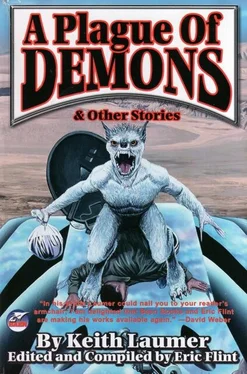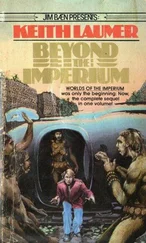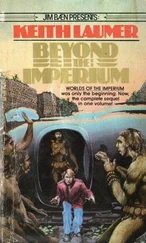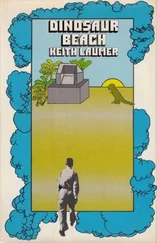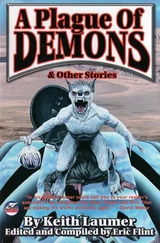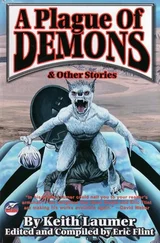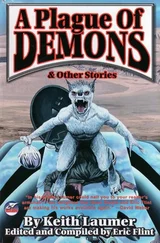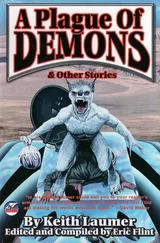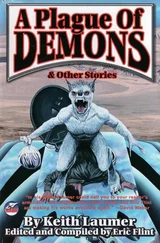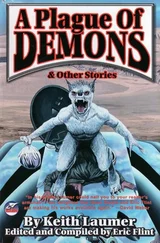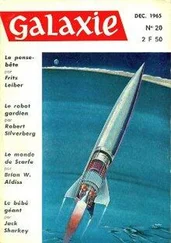A Plague of Demons
by Keith Laumer
It was ten minutes past high noon when I paid off my helicab, ducked under the air blast from the caged high-speed rotors as they whined back to speed, and looked around at the sun-scalded, dust-white, mob-noisy bazaar of the trucial camp-city of Tamboula, Republic of Free Algeria. Merchants’ stalls were a clash of garish fabrics, the pastels of heaped fruit, the glitter of oriental gold thread and beadwork, the glint of polished Japanese lenses and finely-machined Swedish chromalloy, the subtle gleam of hand-rubbed wood, the brittle complexity of Hong Kong plastic—islands in the tide of humanity that elbowed, sauntered, bargained with shrill voices and waving hands or stood idly in patches of black shadow under rigged awnings all across the wide square. I made my way through the press, shouted at by hucksters, solicited by whining beggars and tattooed drabs, jostled by UN Security Police escorting officials of a dozen nations.
I emerged on a badly-paved street of starved royal palms, across from a row of fast-decaying buildings as cosmopolitan in style as the costumes around me. Above the cacophony of the mob, keening Arab music shrilled from cave-like openings redolent of goat and curry, vying with the PA-borne blare of Jump and Jitter, reflecting hectic lunch-hours behind the sweat-dewed glass fronts of the Café Parisien, Die Valkyrie, the Samovar, and the Chicago Snackery.
I crossed the street, dodging the iron-shod wheels of oxcarts, the scorching exhaust of jet-peds, the stinging dust-barrage of cushion cars—snorting one almost palpable stench from my nostrils just in time to catch a new and even riper one. Under a ten-foot glare-sign lettered ALHAMBRA ROOM in phony Arabic script, a revolving door thumped monotonously; I caught it and went through into a sudden gloom and silence. I crossed an unswept mosaic floor, went down three steps into an even darker room with a scatter of gaudy cushions and a gleam of gold filigree. I waved away a yard-square red and gold menu proffered by a nicely-rounded harem slave in a brief vest and transparent trousers. I took a stool at the long bar. A bare-chested, three-hundred-pound eunuch with a cutlass, sash, and turban took my order, slid a frosty glass across the polished black marble. Behind a screen of gilded palm fronds, a small combo made reedy music.
I took a long draught; from the corner of my eye I saw a man slide onto the next stool. Casually, I angled the ring on my left forefinger; its specular surface reflected a narrow, tanned face with a bald forehead, peaked white eyebrows, a Kaiser Wilhelm mustache, and a satanic Vandyck. A pair of frosty blue eyes met mine for an instant in the tiny mirror.
“What’s the get-up for, Felix?” I asked softly. “You traveling in hair-goods now?”
His eyelids flickered. For Felix Severance, that was equivalent to a yelp of astonishment. Then he gave me the trick wink that was service code of “The Enemy May Be Listening.”
“Well, well, John Bravais, as I live and breathe,” he said in his high-pitched voice. “Fancy meeting you here…”
We went through a ritual of hand pumping and when-did-I-see-you-last’s, ordered second drinks, then moved over to a low table. He slipped a small gadget from a pocket, glanced around to see who was watching, then ran it over the light fixture, the salt and pepper shakers, the ashtray, babbling on:
“Martha’s fine. Little Herbie had a touch of Chinese virus, and Charlotte broke a clavicle…” He went on point like a hunting dog, picked up a small tabukuk in the form of a frog-goddess, dropped it inconspicuously into his heavy briefcase.
“I heard you were going into mink farming,” I said, carrying on the charade.
“Decided against it, Johnny.” He checked the spice tray. “Too damned vicious; lousy example for little Lennie and Bertha and the others—” He finished the check, switched off the patter in midsentence, pocketed the spy-eye detector.
“Okay, Johnny,” he said softly. “My little gem-dandy patented nose-counter says we’re clean.” He was looking me over with that quick glance of his that could count the pearls on a dowager’s neck while he was bowing over her wrist. “Thanks for coming.”
“I haven’t run to fat yet, if that’s what’s bothering you,” I said. “Now stop sizing me up and tell me what the false beard is all about. I heard you were here under an open cover as a UN medic.”
“I’m afraid Médecin-Major de Salle attracted some unwelcome attention.” He grinned. “It seems I broached security. I was advised to consider myself under house arrest; a six-footer with a sidearm was assigned to make the point clear. I ditched him in the first dark alley and faded from the scene. A schoolteacher named Brown rented the de Salle villa after the disappearance—but as Brown, I’m not free to move. That’s where you enter the picture.”
“Come to the point, Felix. What was so important that I had to come nine thousand miles in thirteen hours to hear? Do you know where I was?”
He held up a hand. “I know; Barnett told me you’d spent seven months in Bolivia building a cover as a disgruntled veteran of Colonna’s Irregulars. Sorry and all that—”
“Another week and I’d have landed an assignment running a shipment of bootleg surgical spares—”
“The frozen kidneys will have to wait for another time.” He showed me a Mephistophelean smile. “What I have is far more fun.”
“The suspense is unnerving me. Go ahead and spill it.”
“All right. Let’s begin with the world situation.”
“I’d prefer a more cheerful subject—like cancer.”
“We may get to that, too, before this one’s over.” He hitched himself forward, getting down to business. “For most of the last century, John, the world has been at war. We haven’t called it that, of course—nobody’s actually used nuclear warheads. These are nothing but ‘police actions,’ or ‘internal power realignments,’ like the current rumble here in Algeria—maneuvers with live ammunition. But while the powers are whetting their claws on these tupp’ny-’ap’ny shooting matches, they’re looking hard for a weapon that would give one state a decisive advantage. In the meantime—stalemate.”
“Well,” I said, pushing back my chair, “that was mighty interesting, Felix. Thanks for letting me know—”
He leaned across the table. There was a merry glint in his eye; he looked like a devil planning a barbecue.
“We’ve found that weapon, John.”
I settled back into my chair. “All right, I’m listening.”
“Very well: Super Hellbombs are out. The answer lies in the other direction, of course. A crowd of infantrymen killing each other isn’t war—it’s good, healthful sport—just the ticket for working off those perfectly natural aggressions that might otherwise cause trouble. But what if a division or two of foot soldiers suddenly became irresistible? Impervious to attack, deadly on the offensive? Your cosy little brushfire war would turn into a rout for the unlucky side—and there would go your power-balance, shot all to hell—”
“How much better can hand-weapons get? The Norge Combat Imperial weighs six pounds and fires a hundred armor-piercing rounds per second. It’s radar-aimed and dead-accurate—”
“I’m talking about something new, John. We call it PAPA—Power Assisted Personal Armament. What it means is—the Invulnerable Man.”
I watched Felix swallow half his drink, put the glass down, and sit back with his fingertips together, waiting for my reaction. I nodded casually.
“That’s an old idea,” I said carelessly. “I used to follow Batman and Robin myself.”
Читать дальше
